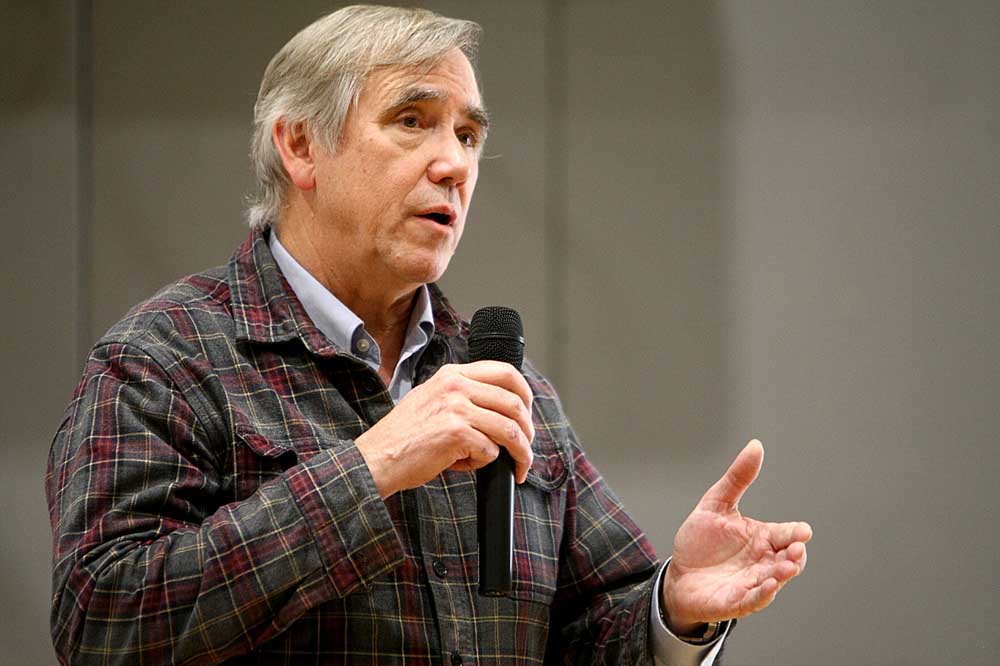Capital Chatter: On Peter Courtney’s long and unusual political career
Published 5:00 pm Thursday, January 19, 2023

- capital chatter logo
Senate President Peter Courtney’s Oregon odyssey was a fluke.
Trending
Way back in June 1969, Courtney was president of his Boston University law school class. As he recalls, he was “somewhat of a character,” not exactly a legal whiz. His colleagues were astounded when an appellate judge offered him a clerkship, even if the job was on the other side of the continent. No one in Courtney’s family, whose lineage dates to the Pilgrims, had even heard of Orygone.
It seems the state renowned for tall trees had just created an intermediate-level appeals court between trial courts and the Oregon Supreme Court. William S. Fort, one of five judges on the new Court of Appeals that would begin work the next month, needed a law clerk. And fast.
Courtney flew to Portland, took the Greyhound bus to Salem, met Fort outside the court, and followed his direction to get a room at the YMCA down the street. He lived there for the next two years.
When the yearlong clerkship ended, Courtney was hooked on Oregon. One attraction was meeting Margie Brenden. They married in 1976.
Trending
Courtney’s family back East was fine with his remaining in Oregon but didn’t encourage his interest in politics.
“They were used to the politics of the East if you know what I mean. It was wheeling and dealing under the table. I mean you had politicians in jail. You had mayors in jail. You had governors … .,” Courtney told me. “And they wanted no part of that from me.”
But Oregon was different. Government was cleaner, more open, more opportunities for citizens to participate.
“There was an identity that existed for Oregon when I came here. There was a love of the natural beauty but also just the way they did things,” he said. “Their local governments did things. I was always amazed at how they were willing to take chances and change things.”
Courtney wasn’t at the State Capitol on Jan. 9, when his 38 years as a legislator and 20 years as Senate president came to an end. He was attending the service for one of Margie’s sisters, delivering the eulogy. Family is his foundation.
When Margie retired a few years ago as one of his legislative aides, I expected he soon would follow. He is devoted to her; she is fiercely loyal to him. Yet he surprised friends and staff by seeking reelection in 2018 to another four-year term.
He has no hobbies. What else would he do?
Courtney served 44 years in elected office, counting his six years on the Salem City Council, where he never missed a meeting.
His legislative attendance record was not so perfect. Dangerous health issues took their toll. His family became adamant that he retire, regardless of whatever desires he had to keep going.
Some people think Courtney, 79, continued too long as Senate president. That he was past his prime and too old-school as state government and the Legislature evolved. That his centrist, more-bipartisan approach was increasingly out-of-step with contemporary politics and his progressive Democratic colleagues.
On the other hand, without his vast experience and steady approach, how would the Legislature have weathered the pandemic and a slew of other recent crises? Courtney cares deeply about the Legislature as an institution, more so than gaining partisan wins.
He was willing to settle for half a loaf, or even a slice today, because it was better than nothing. And tomorrow he might take another slice.
As such, Courtney’s leadership approach differed from that of House Speaker Tina Kotek. For example, he gave Senate committee chairs much freer rein in handling bills. The presiding officers determine the outcome of the legislative session, but the main work is done in committees.
Courtney is more than “somewhat of a character.” He speaks his mind instead of staying on message. He turns press conferences into jovial jousts with journalists. He loved that a long-ago news account described him as “swashbuckling.” He once took offense at being called “quirky,” although I’d consider quirky both endearing and understated.
And now he fears that Oregon has lost its identity and the uniqueness that entranced him: “I always said Oregon liked to be the first or only state to try to do something. I’m not sure that’s true anymore. I think she took great pride in who she was and what she was.”
When Courtney entered the Legislature in the 1980s, he had Democratic colleagues from Pendleton, Klamath Falls and Baker City along with Republican colleagues from the Portland and Eugene metro areas. The legislative makeup today is far different.
Now the Legislature reflects a different state – a divided Oregon.
“The Legislature,” said Peter Michael Coleman Courtney, “simply reflects society.”





